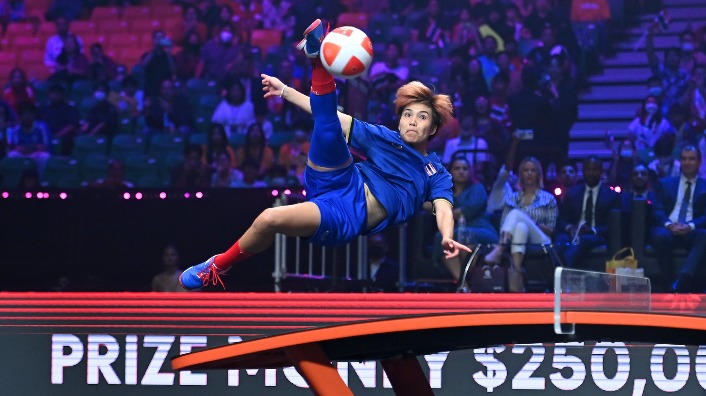
The numbers say: Suphawadi Wongkhamchan was the MVP of the WTC23
We knew before even it started that the World Teqball Championships 2023 was going to be historical. We had the most participants (male and female) in any tournament (210), the most countries (60) and it was the first one held outside of Europe. Thailand proved to be a great host and the event itself lived up to the expectations: dramas, thrillers, upsets and storybook endings all occurred in Bangkok to make the World Championships unforgettable. Now it is time to deep dive into the numbers and take a look at the stats of the best performers.
To clarify, these statistical categories differ from the regular ones, we do not separate singles, doubles, or genders.
So if we examine who were the most dominant players in terms of highest overall point differential per match, we are going to see the only teqer who won two gold medals, Suphawadi Wongkhamchan on top with a score of 15.64. This is no surprise at all, unlike Ester Viana Mendes coming in second with 13.00, who won a bronze medal in women’s doubles. She is followed by another Thai, Jutatip Kuntatong (12.33), who claimed the gold in WD and the silver in women’s singles. Hungarian Krisztina Acs (bronze in mixed doubles) finished fourth with 11.86, and the best among men competitors (also 5th overall) is Csaba Banyik (gold in men’s doubles, bronze in XD) with 11.73.
These numbers indicate that finishing without gold does not necessarily mean the lack of dominance, but rather the close battles late in the knockout phase.
There is no doubt that Wongkhamchan would be the MVP of the tournament, as she also leads the total points category (336) and the overall points difference/match in the elimination rounds with 13.75, more than two points ahead of Balazs Katz (11.50), three ahead of Apor Gyorgydeak (10.57) and Rafaella Fontes (10.25). The world champion played the most matches (14), allowed the least points per set overall (8.36) and in the knockout stage (10.25), finished second in point difference/set in the first (8.00) and second (7.64) periods, and total points/category (168, one behind Acs). Not to mention that her lowest position in any category is fourth. Just incredible.
Kuntatong was also brilliant and the numbers back it up. She was a TOP5 performer in the 2nd sets (4th overall, 5th in the knockouts), allowed the 2nd fewest points per match (11.67), and came in third in total matches (12, tied with Carolyn Greco and Vania Moraes da Cruz) and in total points scored (288).
Staying with the Thais, Phakpong Dejaroen (champion in mixed doubles, bronze medallist in men’s doubles) also put up solid numbers: played the most matches among men (13, 2nd overall), scored the most points total (323, 2nd overall) and per category (161.5, 3rd overall).
We mentioned Csaba Banyik in the points differential category, and he also makes an appearance in the total points scored by being 5th with 276.
We also see that Zsanett Janicsek was the most ready for any game as nobody played better than her in the opening sets (8.25 point difference overall, 7.50 in the elimination rounds), while Ester Viana Mendes was so clutch, being the best in the 2nd sets (8.33 and 7.25, respectively).
As they say, numbers do not lie, so it should not shock anyone that the top 3 countries of the medal rankings (Thailand, Brazil and Hungary) took over the statistical categories, but it is great to see other nations (Colombia with Joshua Bello and Jose Ricardo Oviedo Amortegui, Portugal with Baptiste Berna, Moldova with Viorica Tonu) to appear, and also having Greco from the USA and Gyorgydeak from Romania among the top players. We can not help but enjoy that Teqball is getting more and more international!
FITEQ's VAR (Video Assistant Referee) system debuted one and a half years ago. With its establishment, Teqball became more professional and players got used to it very soon.
“The World Teqball Championships 2023 demonstrated great progress in the VAR and Challenge System, first introduced in Naples in 2022. Initially used only during finals, this year saw significant growth – 20 matches, including all major semi-finals from all 5 categories, featured VAR. The system advanced during the season, allowing challenges in nearly every aspect of the game. Additional cameras were strategically placed to improve the speed of VAR decisions. The emphasis was on the accuracy, showcasing a deliberate approach to decision-making and emphasizing our dedication to fairness and excellence in teqball.” says Norbert Augusztin, Senior Manager of Sport.
For most of the challenges, the referee in the video room did not need more than 40 seconds to come up with the decision which helped both Teqball to evolve and the players to have the right outcomes.